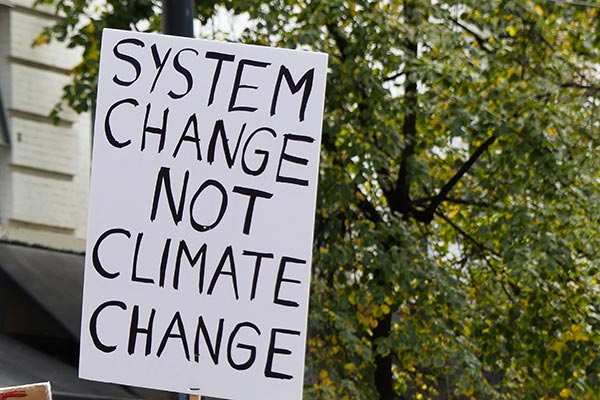Blog: To make our research count, we need to demand better from COP26
Posted on Monday 18 October 2021

Moving to York earlier this year to start working in an area of science that was new to me, I could not have been more excited. The research that I am now part of aims to understand the biology of a photosynthetic bacterium through studying the distribution and dynamics of the approximately 3,000 proteins encoded by its genome.
This will provide us with insights into how these aquatic organisms grow and - of particular interest - how they are able to sequester CO2 and photosynthesise much more efficiently than plants do on land. I would love to see these insights - combined with those of researchers around the globe - help us to increase the amount of CO2 we remove, understand and protect aquatic ecosystems, and produce foods, fuels and other valuable materials in a more sustainable way. But increasingly I fear that it will not be possible to achieve any of these goals without unprecedented systemic changes to our societies and economies.
Warnings
Despite decades of warnings from scientists, global greenhouse gas emissions are still rising and vast swathes of irreplaceable natural ecosystems are intentionally destroyed every day.
These activities already cost lives, and their continuation will rapidly cause cascading impacts that threaten every society and every species on Earth. Much of this destructive and deadly activity is entirely legal, often even funded or subsidised by governments (including in the UK).
Global summits are opportunities for world leaders to work together, confront these problems and build a better future. Yet in the months leading up to our hosting the COP26 climate conference, the UK is making plans to open a new coal mine, oil fields and runways, funding a massive new road building programme, approving the destruction of ancient woodlands and allowing raw sewage to be dumped in rivers.
These are actions that we know will worsen the problems of extreme weather, pollution and biodiversity loss that are already upon us. For COP26 to be successful in its stated aims, the policies of governments and corporations worldwide need to be heading in the opposite direction, prioritising decarbonisation, restoring nature, protecting the most vulnerable communities and building a resilient society for all of us instead of pursuing economic growth for those who will see its short-term benefits.
Holding governments to account
What can we as researchers do to hold our governments accountable for their actions? Firstly, we can make as much noise as possible about the immediate actions and commitments that are necessary for us to realise the potential of our work. You do not need to be a climate scientist or an ecologist to do this; for advances in any area - be it in health, justice, peace, culture or technology - to be realised, we need to protect and repair the systems that support life on our planet.
In the absence of government action, we can also be organising locally to implement the systems that we recognise are required for a fair, sustainable and resilient society from the ground up, by driving progress in areas such as community renewable energy schemes, permaculture food production or more inclusive forms of participatory democracy. Skills and networks from within our University community would be extremely valuable in endeavours of this kind.
Environmental advocacy
Even in situations where our expertise has been highly relevant, academics have often not been very visible in environmental advocacy or activism. This may be a result of the demands of our often competitive work environments or fears about how our involvement might affect our credibility or employability. Either way, recent research suggests the public think scientists should act as advocates for climate-related policies.
In a time where many of us fear for the future and often feel powerless, let’s talk openly about it, get out of our comfort zones to push for the necessary changes in our systems, and support one another in our efforts to make our research count.

Abi Perrin
Research Title: PDRA in cyanobacterial cell biology
Dr Perrin is a Research Associate in cyanobacteria cells in our Department of Biology.
